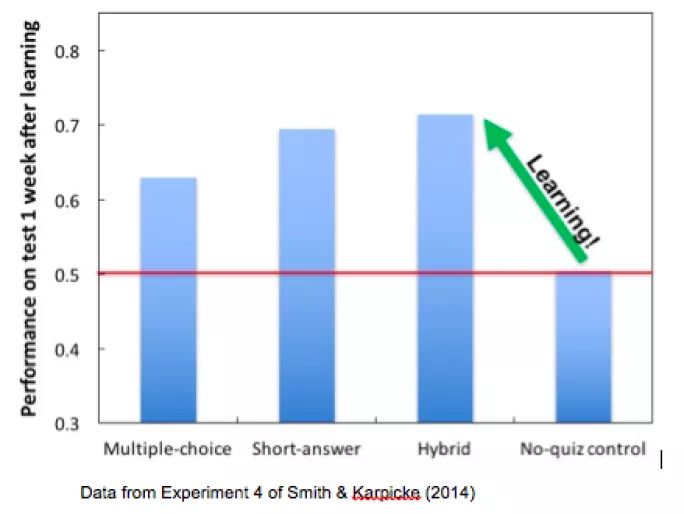
- Home
- Why quizzes are the key to unlocking students’ learning
Why quizzes are the key to unlocking students’ learning

In one of our first articles for TES we talked about the many benefits of quizzing. The bottom line is that frequently practicing retrieval - as happens with quizzes - helps students learn. But, setting quizzes can take time.
The three of us who run the Learning Scientists community project are researchers, but we’re also teachers, and we understand the time constraints in and out of the classroom. We know that frequent essay-style quizzes, or even short-answer quizzes, may not be feasible for every classroom.
Here is the good news: a fair amount of research has looked at different practice quiz formats - for example, short answer vs. multiple choice - and the data suggests there are relatively small differences in the amount of learning produced by these different formats. For example, in one study, I had students read various passages about history topics and then take a quiz with either short-answer, multiple-choice, or hybrid questions - or simply read the passage (the control group).
The short-answer and multiple-choice quizzes were pretty standard. For short-answer questions, students typed the answer to each question, and for multiple choice questions they picked the best answer among five choices. Hybrid questions were a combination of the two: students produced the answer to a question first on their own, and then after clicking a button picked one answer among five choices.
Students then came back a week later and I tested them to see how well they had learned the material from the previous week. All of the groups that took any type of quiz performed better than the no-quiz control. However, there were only extremely small differences between the different quiz formats.
We ran four experiments like this. Each time, those who practiced retrieval learned more than the control group that did not complete a quiz. Yet, when we looked at differences in learning produced by the different types of quizzes, the differences were very small on the final test one week later.
In the figure below, the left three bars represent performance on the test administered one week after learning in the three quiz conditions. Performance was better compared to the no-quiz control group on the right. By comparing the left three bars to the far right bar, we can see the advantage of practicing retrieval by answering quiz questions in any of our three formats!

So what’s the take-away message? Any type of quizzing that encourages retrieval should help students learn. Based on this research and others, we can conclude that there are many quiz formats that improve learning.
For example, students can answer short-answer questions, multiple-choice questions, or use hybrid formats.
Teachers can also get creative and have students write out everything they know in an essay format.
Another option is to create a concept map. To create a concept map, take the main ideas and link them together with phrases that explain the relationship between concepts.
So long as students create a concept map from memory, this exercise encourages retrieval practice. Students can create their own maps from scratch, or teachers can give their students partial concept maps to fill in. To read more about partial concept maps, see our post How Can We Help Our Students Love Quizzing.
The possibilities are endless, and ought to help learning so long as students retrieve the information.
Dr Megan Smith (@DrSmithRIC) is an assistant professor at Rhode Island College. A version of this blog post originally appeared on the Learning Scientists blog. Follow the Learning Scientists on Twitter at @AceThatTest.
Want to keep up with the latest education news and opinion? Follow TES USA on Twitter and like TES USA on Facebook.
References
- Smith, M. A., & Karpicke, J. D. (2014). Retrieval practice with short-answer, multiple-choice, and hybrid tests. Memory, 22, 784-802.
- Smith, M. A., Blunt, J. R., Whiffen, J. W., & Karpicke, J. D. (in press). Does providing prompts during retrieval practice improve learning? Applied Cognitive Psychology.
- Blunt, J. R., & Karpicke, J. D. (2014). Learning with retrieval-based concept mapping. Journal of Educational Psychology, 106, 849-858.
- Karpicke, J. D., Blunt, J. R., Smith, M. A., & Karpicke, S. S. (2014). Retrieval-based learning: The need for guided retrieval in elementary school children. Journal of Applied Research in Memory and Cognition, 3, 198-206.
Register with Tes and you can read five free articles every month, plus you'll have access to our range of award-winning newsletters.
Keep reading for just £4.90 per month
You've reached your limit of free articles this month. Subscribe for £4.90 per month for three months and get:
- Unlimited access to all Tes magazine content
- Exclusive subscriber-only stories
- Award-winning email newsletters
You've reached your limit of free articles this month. Subscribe for £4.90 per month for three months and get:
- Unlimited access to all Tes magazine content
- Exclusive subscriber-only stories
- Award-winning email newsletters



